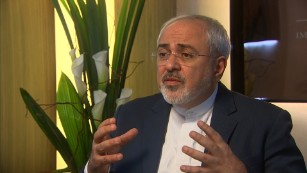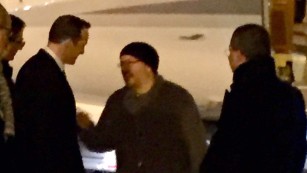Iran: Saudi Arabia is 'panicking,' the 2 countries can coexist
Iran's foreign minister says Saudi Arabia is "panicking" over the potential for reduced tensions between Tehran and the West, that he is happy for the families of Americans previously imprisoned in Iran, and that the U.S. is "addicted" to sanctions.
"We do not have a fight to pick with Saudi Arabia," Javad Zarif told CNN's Christiane Amanpour in an exclusive TV interview.
"We believe that Iran and Saudi Arabia can be two important players who can accommodate each other, who can complement each other, in the region."
"Unfortunately, the Saudis have had the illusion that backed by their Western allies, they could push Iran out of the equation in the region."
Zarif said that the alliance between Saudi Arabia and Western nations, and the tension between those nations and Iran, provided a "smoke screen" that allowed Saudi Arabia to "export this Wahhabi ideology of extremism." (Wahhabism is the branch of Sunni Islam practiced in Saudi Arabia.)
Hopes for relations between Iran and the West are high after last weekend's implementation of a hard-won deal, agreed to last July, to swap relief of sanctions on Iran for guarantees about the peaceful nature of its nuclear program.
The foreign minister emphasized, as he did in an op-ed for The New York Timesearlier this month, that 15 of the 19 September 11 hijackers were Saudis, and blamed the "Wahhabi ideology" for much of the violent extremism now seen in the region and indeed in the West.
Saudis: 'We have confidence in the United States'
Saudi Foreign Minister Adel al-Jubeir told CNN's Wolf Blitzer on Tuesday that his country was deeply skeptical of the Iran nuclear deal.
"We don't have confidence in Iran," he said. "We have confidence in the United States."
Long-simmering tensions between Iran and Saudi Arabia have been on the rise recently.

watch the full interview
Since last year, the two have been fighting a proxy war of sorts over Yemen, where Saudi Arabia has intervened.
But the problems really flared just after the new year, when Saudi Arabia executed 47 people, including a prominent Shiite cleric.
The Iranian government expressed indignation, and protesters in Tehran attacked the Saudi Arabian Embassy. Six Middle Eastern nations decried Iran's failure to protect the embassy, and Saudi Arabia cut off diplomatic relations. Days later, Iran accused Saudi Arabia of intentionally striking its embassy in Yemen.
Zarif told CNN: "We don't expect, or we're not interested even, in pushing Saudi Arabia out of this region, because Saudi Arabia is an important player in this region."
"We were always in the community of nations. Now their allies have recognized that Iran is a serious partner."
Zarif 'happy' for families of released prisoners
Zarif was at the center of a high-stakes deal between the United States and Iran over the weekend to swap prisoners.
America won the release of five citizens, including Washington Post journalist Jason Rezaian, and in turn released seven Iranians the country held on charges relating to the sanctions that have now been lifted.
But the deal was almost thrown off at the last minute when Iran tried to prevent Rezaian's wife and mother from boarding the Swiss plane that was to ferry them to freedom. It was only after a personal call from U.S. Secretary of State John Kerry, with whom Zarif had developed a personal relationship over the long nuclear talks, that the matter was resolved.
Brett McGurk: Iranian hostage swap almost didn't happen
As soon as Kerry showed him that "it was part of the deal," Zarif said, he made sure Iran kept its end of the bargain.
"That's the type of people we are. We implement. We fulfill our promises."
"I'm happy for all the families. I'm happy for the family of Jason, and the family of Amir Hekmati, and Mr. Abedini, and others, now have their loved ones with them."
"We believe that they had committed acts that were illegal."
"All of them are Iranian-American families," he said referring, as well, to most of the prisoners released by the U.S. "I'm happy for the families of other Iranian-Americans, who still live in the United States, but (are) now back to their loved ones."
"I think it was an important achievement that we all made together."
America has 'fixation on missiles'
The prisoner swap and nuclear deal do not mean Iran and the United States are suddenly allies.
Just as the United States was lifting sanctions on Iran's nuclear program, it wasimplementing new ones over entities and individuals linked to the country's ballistic missile program, which it said poses "a significant threat to regional and global security.
"We believe there was no base in law," Zarif said of the new sanctions, "there was no base in reality and it wasn't necessary."
"The United States has this fixation on missiles."
"I call it a sort of addiction -- addiction that some in the United States have to sanctions and pressure."
"Just like people who smoke, they know that (sanctions) don't work, but the addiction prevents them from just calling it quits."
"So I think it's best if the United States would once and for all determine for itself that sanctions don't work. That with Iran, negotiations, talking, respect, always works."
News Courtesy: www.cnn.com












